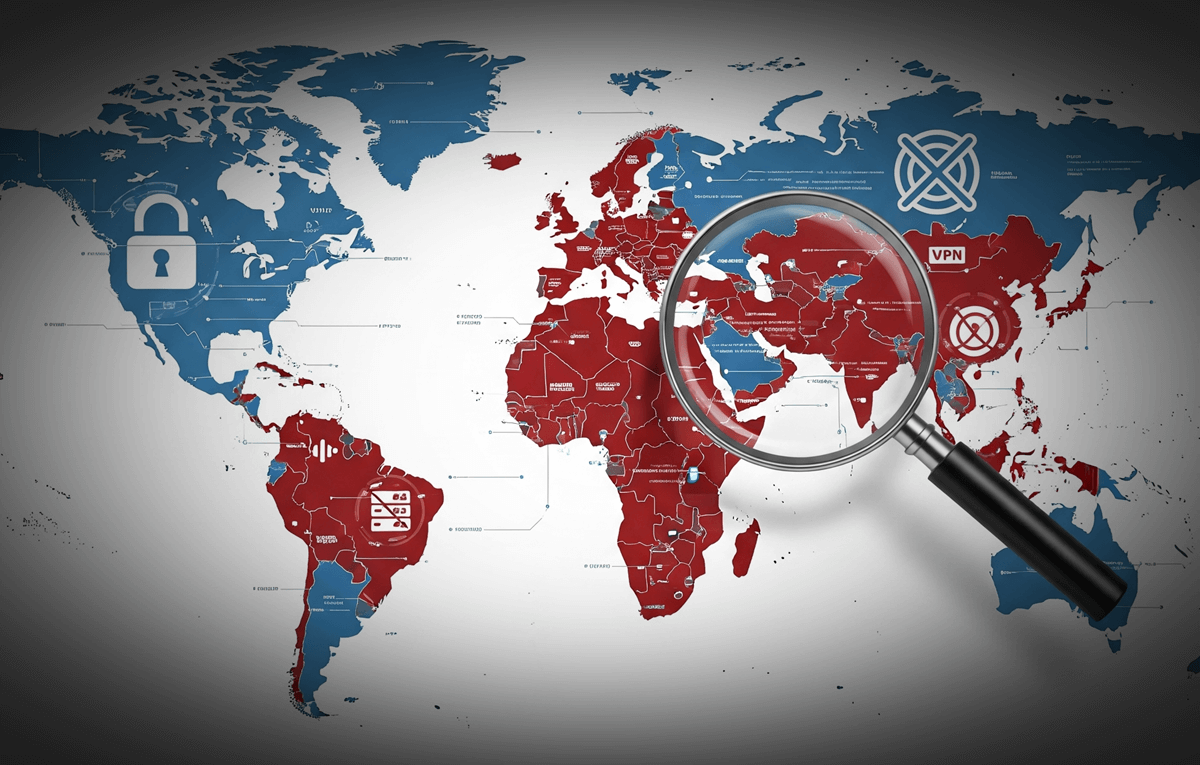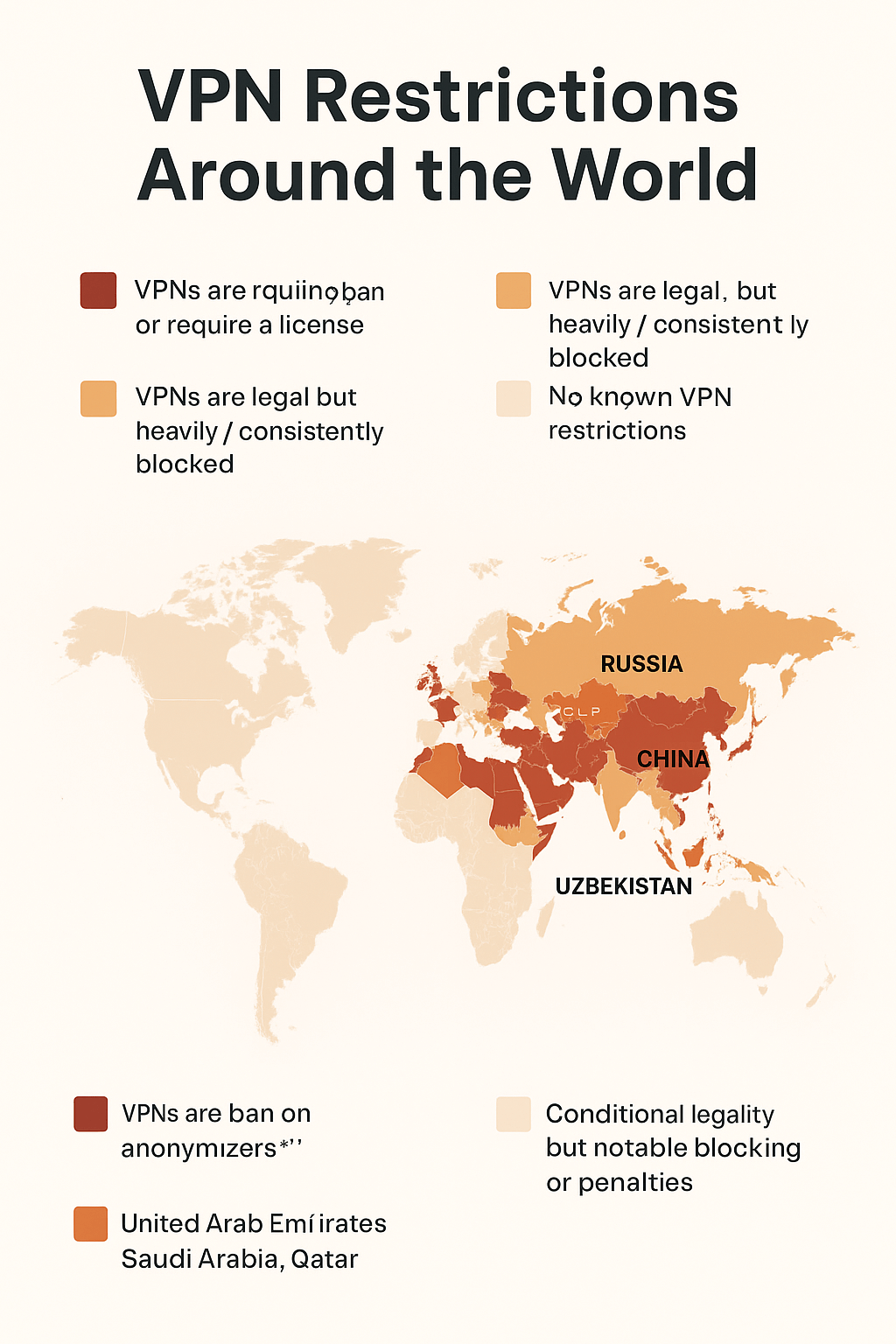VPN Restrictions 2026 – Countries That Block Them and How to Bypass
Virtual Private Networks (VPNs) have become essential tools for individuals and organizations seeking online privacy, data protection, and access to global digital resources. In this article, I will share about VPN restrictions by country and how to bypass the restrictions and censorships.
Governments worldwide often view VPNs with suspicion, particularly in contexts where state control over information flows and political discourse is prioritized. The result is a fragmented global landscape in which some countries embrace VPN use, others regulate it tightly, and a significant number outright block or criminalize it.
This article offers a comprehensive overview of VPN restrictions across the globe as of 2026, analyzing where and how governments block VPNs, why they do it, and what the implications are for citizens, businesses, and travelers. We will also provide infographic ideas and suggested data visualizations to illustrate the scope and scale of restrictions.
Why Governments Restrict VPNs

Before exploring the country‑by‑country restrictions, it’s useful to understand why VPNs are controversial in certain jurisdictions:
- Circumvention of Censorship – VPNs allow users to bypass government blocks on websites and social media.
- Surveillance Avoidance – VPNs encrypt traffic, making mass monitoring more difficult.
- National Security Concerns – Authorities often argue that VPNs can be used for cybercrime, terrorism, or dissident activity.
- Economic Reasons – Some states claim VPNs hurt domestic media, telecommunications, or tax revenue streams.
Countries that Ban VPN Use Entirely or Require Licenses
These states impose strict bans or licensing regimes, where unauthorized VPN use can lead to fines, imprisonment, or both.
1. Myanmar
- Status: Illegal without government approval.
- Law: 2026 Cybersecurity Law.
- Penalties: Prison terms and heavy fines for using unlicensed VPNs.
- Motivation: Information control under military rule.
2. Iran
- Status: Only state‑approved VPNs permitted.
- Practice: Unauthorized VPNs frequently blocked; sellers prosecuted.
- Impact: Millions still rely on VPNs to access Instagram, WhatsApp, and international news.
3. Oman
- Status: Personal VPN use prohibited since 2010; corporate use requires approval from the Telecommunications Regulatory Authority (TRA).
- Penalties: Steep fines for individuals and enterprises using unapproved VPNs.
4. Belarus
- Status: Ban on anonymizers, including VPNs and Tor, enforced through deep packet inspection (DPI).
- Motivation: To suppress opposition and control information, especially around elections.
5. Turkmenistan
- Status: VPNs widely blocked; citizens face harassment or fines if discovered.
- Context: The country maintains one of the world’s most restrictive internet regimes.
6. North Korea
- Status: Complete prohibition.
- Context: Ordinary citizens cannot legally access the global internet, making VPNs inaccessible.
Countries with Legal VPNs but Heavy Blocking
These countries permit VPNs under the law, but in practice, block or disrupt access to most VPN services.
1. Russia
- Action: Hundreds of VPN services blocked by late‑2024.
- 2026 Law: Increased penalties for promoting or using VPNs to reach banned content.
- Impact: Businesses and individuals face frequent disruptions.
2. China (Mainland)
- Action: Great Firewall blocks unapproved VPNs.
- Exceptions: Licensed enterprise VPNs allowed under government supervision.
- Enforcement: App stores forced to remove VPN apps; connections actively disrupted.
3. Türkiye (Turkey)
- Action: Telecommunications Authority (BTK) blocks waves of VPNs; over 20 services blocked since late‑2023.
- Context: Used to enforce social media restrictions during political unrest.
4. Egypt
- Action: Hundreds of VPN and proxy websites blocked since 2017.
- Observation: OONI tests confirm ongoing interference in 2024–2026.
5. Uzbekistan
- Status: VPNs not outright illegal, but many services intermittently blocked.
- Context: Often coincides with political events or platform restrictions.
Conditional Legality with Heavy Restrictions
In these states, VPN use is technically legal, but misuse or circumvention of censorship can result in serious penalties.
1. United Arab Emirates (UAE)
- Status: Legal for legitimate purposes.
- Law: Federal Decree-Law No. 34 of 2021.
- Penalties: Heavy fines and prison sentences for using VPNs to commit or conceal crimes.
2. Saudi Arabia
- Status: VPNs are legal, but many providers blocked.
- Context: Citizens can access VPNs, but the experience is inconsistent.
3. Qatar
- Status: VPNs legal, but subject to strict cybercrime laws.
- Context: Services often restricted during sensitive political events.
Temporary or Event‑Based Blocks
Some governments block VPNs during specific events such as elections, protests, or national exams.
1. Uganda
- Incidents: Over 100 VPNs blocked during January 2021 elections.
- Pattern: Often coincides with efforts to enforce social media taxes or suppress political dissent.
2. Ethiopia
- Incidents: Widespread social media and VPN blocks during protests and conflicts since 2023.
- Motivation: Political stability and information suppression.
3. Pakistan
- Incidents: Multiple VPN services blocked intermittently amid protests.
- Development: Testing of a national firewall to centralize censorship.
VPN Restrictions Around The World

1. World Map of VPN Restrictions
- Color‑coded categories:
- Red: Full bans (Myanmar, Iran, Turkmenistan, North Korea, Oman, Belarus).
- Orange: Legal but heavily blocked (Russia, China, Turkey, Egypt, Uzbekistan).
- Yellow: Conditional legality with penalties (UAE, Saudi Arabia, Qatar).
- Blue: Temporary event‑based blocks (Uganda, Ethiopia, Pakistan).
2. Timeline Chart: VPN Blocking Laws (2010–2026)
- Show introduction of VPN restrictions year by year.
- Example milestones: Oman (2010), Belarus (2015), Egypt (2017), Russia (2019–2026 escalations), Myanmar (2025).
3. Bar Chart: Penalties for Unauthorized VPN Use
- Compare maximum fines and prison terms (e.g., UAE vs. Oman vs. Myanmar).
4. Pie Chart: Motivations Behind VPN Blocks
- Segments:
- Political censorship
- Surveillance
- Economic (media/tax revenue)
- National security
Global Implications
- Digital Rights: VPN restrictions undermine digital freedom and access to information.
- Business Risk: Enterprises operating globally face uncertainty in markets with strict VPN laws.
- Innovation: VPN blocks encourage innovation in circumvention tools but also fuel state investment in surveillance.
- Tourism and Travel: Visitors to restrictive states face challenges maintaining secure connections.
VPN Providers Performance Overview
Here’s a breakdown of how each VPN provider on our list performs in countries that heavily restrict or block VPN access (like China, Iran, Russia, Turkey, Egypt, Turkmenistan, North Korea, Oman, UAE, Saudi Arabia, Qatar, Uganda, Ethiopia, Pakistan), based on expert reviews and recent user reports:
| VPN Provider | Known Effectiveness in Highly Restricted Countries |
|---|---|
| ExpressVPN | Mixed results — advertised as reliable, but widely reported as unreliable or non-working in China and Russia. Some sources still claim it works in Iran & China. Give it a try for free. |
| NordVPN | Ranked as the best VPN for China and Iran, with obfuscated servers that perform well behind censorship. |
| Surfshark | Often highly rated for flexibility and “NoBorders” mode—likely to work fairly reliably in restricted regions. |
| ProtonVPN | Highly recommended for Iran; generally strong for censorship resistance overall. |
| CyberGhost | Less clear—popular-streaming-focused, but limited evidence in heavy censorship zones. |
| Private Internet Access (PIA) | Offers obfuscation tools and TCP-443 routing; some suggest it can work in heavily restricted settings like China. |
| IPVanish | No strong evidence supporting its use in restricted countries; likely limited support. |
Detailed Insights with Citations
China: Frequently advertised as reliable, but user reports are overwhelmingly negative:
“ExpressVPN claims that it works in China, but it does not (tested in July 2023)”
“ExpressVPN didn’t work for a single day while I was there.”
Russia: Also reportedly unreliable:
“ExpressVPN does not work at all in Russia.”
Some sites still list it as working in Iran and China, but this seems more aspirational marketing than grounded in current user experience.
2. NordVPN
Highlighted as the most effective VPN for China as of mid-2026:
- Boasts 90% retention of original speed behind the Great Firewall.
- Offers obfuscated servers tailored to bypass censorship.
Also rated highly for Iran:
- Regarded as “best VPN for Iran” with robust censorship evasion and secure protocols.
Cybernews
3. Surfshark
- Cited for affordability and strong tools designed for restricted regions (“NoBorders” mode).
4. ProtonVPN
- Widely recommended for Iran due to its anti-censorship capabilities and extensive server network.
- Maintains strong reputation as a privacy-first VPN, based in Switzerland.
Wikipedia
5. PIA (Private Internet Access)
- Offers obfuscation and port 443 tunneling—effective techniques in heavily censored environments.
- Proven no-logs policy and solid customization options provide additional trust.
6. CyberGhost & IPVanish
- CyberGhost: Recognized for streaming and ease-of-use, but no specific evidence for restricted-country reliability.
- IPVanish: Noted as a dependable streaming VPN, but not proven in highly censored regions.
Best VPN Service To Bypass Restrictions & Censorship
If you’re searching for a best VPN to bypass local restrictions and censorship, check out my other detailed post on the Best VPN services.
Conclusion
VPN restrictions reflect broader struggles over internet governance and digital sovereignty. While some governments present these measures as tools of national security, the reality is often the suppression of dissent and control of information. The global patchwork of laws and practices means that internet users, businesses, and travelers must remain vigilant, informed, and adaptive.
As of 2026, more than a dozen countries actively block or criminalize VPN use, while many others impose partial restrictions. The trend suggests that VPNs will continue to be a battleground technology in the broader fight for digital rights.
Source
Please follow my WhatsApp Channel for the latest updates. You can also Contact Me if you need any further assistance.






